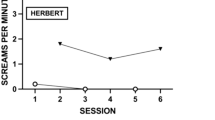Abstract
This project evaluated the effect of time-out release contingencies on changes in child noncompliance to maternal instructions. Twenty-four clinic-referred, noncompliant, preschool children served as subjects. Each child was assessed under baseline conditions and then under one of three experimental conditions: Parent Release, Child Release, or Control. Children in the Parent Release and Child Release conditions experienced time-out contingent upon noncompliance. Temporal and behavioral time-out release contingencies were present in the Parent Release condition but not in the Child Release condition. A spanking procedure was used to inhibit premature escape from time-out for children in the Parent Release group. The results indicated that both time-out groups demonstrated increased compliance ratios. However, improvement associated with the Child Release condition was considered to be clinically insignificant.
Similar content being viewed by others
References
Barlow, D. H., & Herson, M. Single-case experimental designs.Archives of General Psychiatry, 1973,29, 319–325.
Bernal, M. E. Behavioral feedback in the modification of brat behaviors.Journal of Nervous and Mental Disease, 1969,148, 375–385.
Bernal, M. E., Duryee, J. S., Pruett, H. L., & Burns, B. J. Behavior modification and the brat syndrome.Journal of Consulting and Clinical Psychology, 1968,32, 447–455.
Dreikurs, R.Children: The challenge. New York: Hawthorn, 1964.
Dreikurs, R., & Grey, L.A new approach to discipline: Logical consequences. New York: Hawthorn, 1968.
Forehand, R. Child noncompliance to parent commands: Behavioral analysis and treatment. In M. Hersen, R. M. Eisler, & P. M. Miller (Eds.),Progress in behavior modification (Vol. 5). New York: Academic Press, 1977.
Forehand, R., & King, H. E. Noncompliant children: Effect of parent training on behavior and attitude change.Behavior Modification, 1977,1, 93–108.
Forehand, R., & Peed, S. Training parents to modify noncompliant behavior of their children. In A. J. Finch, Jr., & P. C. Kendall (Eds.),Treatment and research in child psychopathology. New York: Spectrum, 1979.
Hobbs, S. A., & Forehand, R. Effects of differential release from time-out on children's deviant behavior.Journal of Behavior Therapy and Experimental Psychiatry, 1975,6, 256–257.
Hobbs, S. A., Forehand, R., & Murray, R. G. Effects of various durations of timeout on the noncompliant behavior of children.Behavior Therapy, 1978,9, 652–656.
Johnson, S. M., & Bolstad, O. D. Methodological issues in naturalistic observation: Some problems and solutions for field research. In L. A. Hamerlynck, L. C. Handy, & E. J. Mash (Eds.),Behavior change: Methodology, concepts, and practice. Champaign, Illinois: Research Press, 1973.
Kent, R. N., & Foster, S. L. Direct observation procedures: Methodological issues in naturalistic settings. In A. R. Cinimero, K. S. Calhoun, & H. E. Adams (Eds.),Handbook of behavioral assessment. New York: Wiley, 1977.
MacDonough, T. S., & Forehand, R. Response-contingent time out: Important parameters in behavior modification with children.Journal of Behavior Therapy and Experimental Psychiatry, 1973,4, 231–236.
Patterson, G. R., Reid, J. B., Jones, R. R., & Conger, R. E.A social learning approach to family intervention. Vol. 1. Families with aggressive children. Eugene, Oregon: Castelia, 1975.
Peed, S., Roberts, M., & Forehand, R. Evaluation of the effectiveness of a standardized parent training program in altering the interaction of mothers and their noncompliant children.Behavior Modification, 1977,1, 323–350.
Roberts, M., Hatzenbuehler, L., & Bean, A. The effects of differential attention and timeout on child noncompliance.Behavior Therapy, 1980, in press.
Roberts, M. W., McMahon, R. J., Forehand, R., & Humphreys, L. The effect of parental instruction-giving on child compliance.Behavior Therapy, 1978,9, 793–798.
Wahler, R. G. Oppositional children: A quest for parent reinforcement control.Journal of Applied Behavior Analysis, 1969,2, 159–170.
Zeilberger, J., Sampen, S. E., & Sloane, H. N. Modification of a child's problem behaviors in the home with the mother as therapist.Journal of Applied Behavior Analysis, 1968,1, 47–53.
Author information
Authors and Affiliations
Additional information
The authors wish to express their appreciation to Dave DeLawyer, Larry Snapp, and Mike Samac for their assistance in conducting the study.
Rights and permissions
About this article
Cite this article
Bean, A.W., Roberts, M.W. The effect of time-out release contingencies on changes in child noncompliance. J Abnorm Child Psychol 9, 95–105 (1981). https://doi.org/10.1007/BF00917860
Issue Date:
DOI: https://doi.org/10.1007/BF00917860




